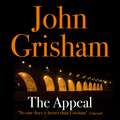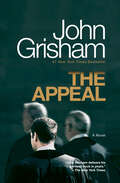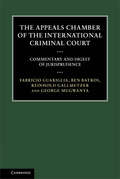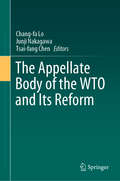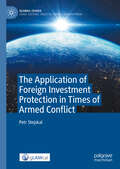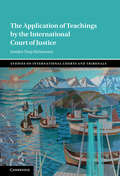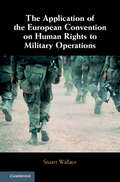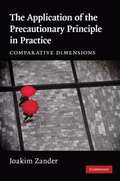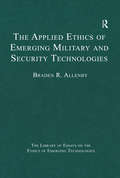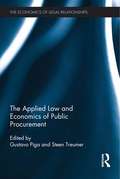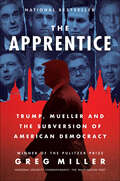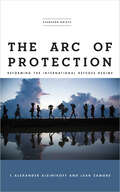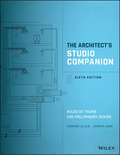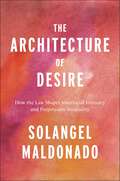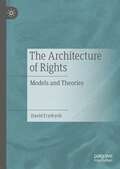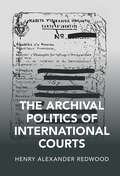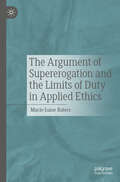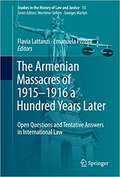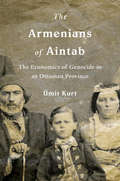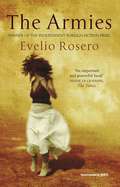- Table View
- List View
The Appeal
by John GrishamIn a crowded courtroom in Mississippi, a jury returns a shocking verdict against a chemical company accused of dumping toxic waste into a small town's water supply, causing the worst "cancer cluster" in history. The company appeals to the Mississippi Supreme Court, whose nine justices will one day either approve the verdict or reverse it.Who are the nine? How will they vote? Can one be replaced before the case is ultimately decided?The chemical company is owned by a Wall Street predator named Carl Trudeau, and Mr. Trudeau is convinced the Court is not friendly enough. With judicial elections looming, he decides to try to purchase himself a seat on the Court. The cost is a few million dollars, a drop in the bucket for a billionaire like Mr. Trudeau. Through an intricate web of conspiracy and deceit, his political operatives recruit a young, unsuspecting candidate. They finance him, manipulate him, market him, and mold him into a potential Supreme Court justice. Their Supreme Court justice.The Appeal is a powerful, timely, and shocking story of political and legal intrigue, a story that will leave readers unable to think about our electoral process or judicial system in quite the same way ever again.(P)2008 Random House, LLC
The Appeal: A Novel
by John Grisham#1 NEW YORK TIMES BESTSELLER • In a crowded courtroom in Mississippi, a jury returns a shocking verdict against a chemical company accused of dumping toxic waste into a small town&’s water supply, causing the worst &“cancer cluster&” in history. The company appeals to the Mississippi Supreme Court, whose nine justices will one day either approve the verdict—or reverse it. The chemical company is owned by a Wall Street predator named Carl Trudeau, and Mr. Trudeau is convinced the Court is not friendly enough to his interests. With judicial elections looming, he decides to try to purchase himself a seat on the Court. The cost is a few million dollars, a drop in the bucket for a billionaire like Mr. Trudeau. Through an intricate web of conspiracy and deceit, his political operatives recruit a young, unsuspecting candidate. They finance him, manipulate him, market him, and mold him into a potential Supreme Court justice. Their Supreme Court justice.Don&’t miss John Grisham&’s new book, THE EXCHANGE: AFTER THE FIRM!
The Appeals Chamber of the International Criminal Court: Commentary and Digest of Jurisprudence
by Dr Fabricio Guariglia Ben Batros Reinhold Gallmetzer George MugwanyaA comprehensive source of the most authoritative statements of the International Criminal Court's appellate jurisprudence. Its clear format includes commentaries followed by excerpts of the decisions and judgments, carefully selected by lawyers based on their relevance and grouped by topic. It provides a practical background to the International Criminal Court's appellate jurisprudence from experienced current and former Appeals Counsel of the Office of the Prosecutor of the Court, highlighting pertinent issues. In doing so, readers are given the tools to discern the meaning of the case law themselves, while attention is drawn to the most important developments in the jurisprudence. This text presents an authoritative and comprehensive digest of the Appeals Chamber's jurisprudence, bringing the relevant case extracts together for the first time with clear and informative commentary.
The Appellate Body of the WTO and Its Reform
by Chang-Fa Lo Junji Nakagawa Tsai-Fang ChenThis is the first book that critically examines the reform of the Appellate Body (AB) of the World Trade Organization (WTO) in light of the current crisis resulting from the U.S. blocking of the appointment of its members. The reform of the AB is critical, as the appointment crisis could lead to the demise of “the jewel in the crown,” which may even cause the dismantling of the WTO as a whole. This book covers various aspects of the crisis and its reform. Specifically, as the crisis cannot be fully understood without reviewing the role of the AB from the broader perspectives of the other functions of the WTO, the book examines the reform of the AB from the broader perspectives of the WTO governance. Additional focus is on the reform of the AB in relation to its specific functions. Available options are provided to address the AB crisis, as well as discussion of wider implications beyond the WTO. Contributed by world-renowned academics, experts, and practitioners in the field of international economic law, this volume provides a comprehensive analysis of the AB crisis and its solutions.
The Application of Contracts in Developing Offshore Oil and Gas Projects
by Philip Loots Donald CharrettThis book provides a comprehensive overview of the key aspects and contracts involved in the process of developing oil and gas projects, with an emphasis on offshore developments. Project development in oil and gas carries with it numerous unique risks and challenges. By identifying and managing risk through the various contract stages, each stage of the project is seen in perspective and therefore gives readers a better understanding of how that stage was arrived at and what is expected to come later. To do this, the authors use illustrative international case studies from past and current projects, thereby deepening the reader’s understanding and awareness of risk from practical experience, as well as suggesting answers for those who are involved in developing oil and gas projects. The Application of Contracts in Developing Offshore Oil and Gas Projects is intended for project owners, project managers, contractors, finance managers, commercial managers and lawyers who seek to understand the subject from a practical point of view.
The Application of Contracts in Engineering and Construction Projects
by Donald CharrettWritten by an engineer and construction lawyer with many years of experience, The Application of Contracts in Engineering and Construction Projects provides unique and invaluable guidance on the role of contracts in construction and engineering projects. Compiling papers written and edited by the author, it draws together a lifetime of lessons learned in these fields and covers the topics a practicing professional might encounter in such a project, developed in bite-sized chunks. Key topics included are: the engineer and the contract; the project and the contract; avoidance and resolution of disputes; forensic engineers and expert witnesses; and international construction contracts. The inclusion of numerous case studies to illustrate the importance of getting the contract right before it is entered into, and the consequences that may ensue if this is not done, makes The Application of Contracts in Engineering and Construction Projects essential reading for construction professionals, lawyers and students of construction law.
The Application of Foreign Investment Protection in Times of Armed Conflict (Global Issues)
by Petr StejskalThe monograph presents scenarios of situations where foreign investments suffer damage. These model scenarios are based on thorough analysis of real cases, facts from the ground and recent arbitral practice (relating namely to arbitrations against Russia, Syria or Libya). This allows the author, in the next step, to ascertain what rules are applicable to the conduct of states towards foreign investments, but also to demonstrate how they apply in real-case scenarios. In particular, the work identifies and applies to these tailored scenarios relevant norms of international investment law, international humanitarian law and international human rights law. These regimes are relevant for protection of foreign investment, but they differ as to the situations they govern, parties whose conduct they regulate and obligations they stipulate. It is therefore appropriate to analyse in their interconnection how these rules govern typical situations that may arise during armed conflict and what particularly they prescribe. On the basis of application of these rules on the defined scenarios, the monograph focuses on the issue of applicability of investment treaties in occupied territories and on interactions and on the issue of conflict of norms in situations where foreign investments qualify as military objectives.
The Application of Teachings by the International Court of Justice (Studies on International Courts and Tribunals)
by Sondre Torp HelmersenHow do the judges of the International Court of Justice, the most authoritative court in international law, use teachings when deciding cases? This book is the first book-length examination of how teachings are used in an important international institution. It uses three different methodologies: a traditional legal analysis, an empirical analysis where citations of teachings are counted and interviews with judges and staff. Three main patterns are identified: teachings have generally low weight, but this weight varies between different works and between different judges. The book suggests explanations for the patterns it identifies, in order to contribute to understanding not only when and how teachings are used, but also why, and compares the Court's practice with that of other international courts and tribunals. This study fills a gap in the international legal literature and will be essential reading for scholars and practicing international lawyers.
The Application of the European Convention on Human Rights to Military Operations
by Stuart WallaceThe European Convention on Human Rights is being applied to military operations of every kind from internal operations in Russia and Turkey, to international armed conflicts in Iraq, Ukraine and elsewhere. This book exposes the challenge that this development presents to the integrity and universality of Convention rights. Can states realistically investigate all instances where life is lost during military operations? Can the Convention offer the same level of protection to soldiers in combat as it does to its citizens at home? How can we reconcile the application of the Convention with other international law applicable to military operations? This book offers detailed analysis of how the Convention applies to military operations of all kinds. It highlights the creeping relativism of the standards applied by the European Court of Human Rights to military operations and offers guidance on how to interpret and apply the Convention to military operations.
The Application of the Precautionary Principle in Practice
by Joakim ZanderThis overview of the role played by the precautionary principle in international trade law, European law and national law compares how precautionary considerations have been applied in the fields of pesticide regulation and the regulation of base stations for mobile telephones in Sweden, the UK and the US. A number of problems in the current application of the precautionary principle are identified and discussed. For example, it is shown that a firm reliance on a wide and open-ended precautionary principle may lead to problems with the consistency, foreseeability, effectiveness and efficiency of measures intended to reduce environmental or health risks. It is suggested that the precautionary principle indeed may be an important tool, but that in order to be acceptable it must be coupled with strong requirements on the performance of risk assessments, cost/benefit analyses and risk trade-off analyses.
The Applied Ethics of Emerging Military and Security Technologies (The Library of Essays on the Ethics of Emerging Technologies)
by Braden R. AllenbyThe essays in this volume illustrate the difficult real world ethical questions and issues arising from accelerating technological change in the military and security domains, and place those challenges in the context of rapidly shifting geopolitical and strategic frameworks. Specific technologies such as autonomous robotic systems, unmanned aerial vehicles, cybersecurity and cyberconflict, and biotechnology are highlighted, but the essays are chosen so that the broader implications of fundamental systemic change are identified and addressed. Additionally, an important consideration with many of these technologies is that even if they are initially designed and intended for military or security applications, they inevitably spread to civil society, where their application may raise very different ethical questions around such core values as privacy, security from criminal behaviour, and state police power. Accordingly, this volume is of interest to students of military or security domains, as well as to those interested in technology and society, and the philosophy of technology.
The Applied Law and Economics of Public Procurement: Applied Law And Economics Of Public Procurement (The Economics of Legal Relationships)
by Steen Treumer Gustavo PigaThis book explores Public Procurement novelties and challenges in an interdisciplinary way. The process whereby the public sector awards contracts to companies for the supply of works, goods or services is a powerful instrument to ensure the achievement of new public goals as well as an efficient use of public funds. This book brings together the papers that have been presented during the "First Symposium on Public Procurement", a conference held in Rome last summer and to be repeated again yearly. As Public Procurement touches on many fields (law, economics, political science, engineering) the editors have used an interdisciplinary approach to discuss four main topics of interest which represent the four different parts in which this book is divided: Competitive dialogue and contractual design fostering innovation and need analysis, Separation of selection and award criteria, including exclusion of reputation indicators like references to experience, performance and CV’s from award criteria, Retendering a contract for breach of procurement rules or changes to contract (contract execution), Set-asides for small and medium firms, as in the USA system with the Small Business Act that reserves shares of tenders to SMEs only.
The Appointment: What Your Doctor Really Thinks During Your Ten-Minute Consultation
by Dr Graham EastonDespite the modern trend towards empowering patients and giving them more choice, the nuts and bolts of medical practice largely remain a mystery - a closed box. In fact, the more health information is available on the internet, the more patients can feel swamped and confused. The Appointment offers an intimate and honest account of how a typical GP tries to make sense of a patient's health problems and manage them within the constraints of their health system and the short ten minute appointment. We have always been fascinated by our own health but in recent years, especially for older people, seeing the GP has become a regular activity. In the past decade the average number of times a patient visits his or her GP has almost doubled. Despite this increasing demand, getting to see a GP is not always easy so those intimate ten minutes with the doctor are extremely precious, and there's more than ever to cram in. Taking the reader through a typical morning surgery, The Appointment shines a light onto what is really going on in those central ten minutes and lets the reader, for the first time, get inside the mind of the person sitting in front of them - the professional they rely on to look after their health. Experienced GP Dr Graham Easton shows how GPs really think, lays bare their professional strengths and weaknesses, and exposes what really influences their decisions about their patients' health.
The Apprentice: Trump, Mueller and the Subversion of American Democracy
by Greg MillerFrom two-time Pulitzer Prize–winning Washington Post national security reporter Greg Miller, the truth about Vladimir Putin’s covert attempt to destroy Hillary Clinton and help Donald Trump win the presidency, its possible connections to the Trump campaign, Robert Mueller’s ensuing investigation of the president and those close to him, and the mystery of Trump’s steadfast allegiance to Putin.It has been called the political crime of the century: a foreign government, led by a brutal authoritarian leader, secretly interfering with the American presidential election to help elect the candidate of its choice. Now two-time Pulitzer Prize–winning Washington Post national security reporter Greg Miller investigates the truth about the Kremlin’s covert attempt to destroy Hillary Clinton and help Donald Trump win the presidency, Trump’s steadfast allegiance to Vladimir Putin, and Robert Mueller’s ensuing investigation of the president and those close to him. Based on interviews with hundreds of people in Trump’s inner circle, current and former government officials, individuals with close ties to the White House, members of the law enforcement and intelligence communities, foreign officials, and confidential documents, The Apprentice offers striking new information about:the hacking of the Democrats by Russian intelligence;Russian hijacking of Facebook and Twitter;National Security Adviser Michael Flynn’s hidden communications with the Russians;the attempt by Jared Kushner, Trump’s son-in-law, to create a secret back channel to Moscow using Russian diplomatic facilities;Trump’s disclosure to Russian officials of highly classified information about Israeli intelligence operations;Trump’s battles with the CIA and the FBI and fierce clashes within the West Wing;Trump’s efforts to enlist the director of national intelligence and the director of the National Security Agency to push back against the FBI’s investigation of his campaign;the mysterious Trump Tower meeting;the firing of FBI Director James Comey;the appointment of Mueller and the investigation that has followed;the tumultuous skirmishing within Trump’s legal camp;and Trump’s jaw-dropping behavior in Helsinki. Deeply reported and masterfully told, The Apprentice is essential reading for anyone trying to understand Vladimir Putin’s secret operation, its catastrophic impact, and the nature of betrayal.
The Arc of Protection: Reforming the International Refugee Regime
by T. Alexander Aleinikoff Leah ZamoreThe international refugee regime is fundamentally broken. Designed in the wake of World War II to provide protection and assistance, the system is unable to address the record numbers of persons displaced by conflict and violence today. States have put up fences and adopted policies to deny, deter, and detain asylum seekers. People recognized as refugees are routinely denied rights guaranteed by international law. The results are dismal for the millions of refugees around the world who are left with slender prospects to rebuild their lives or contribute to host communities. T. Alexander Aleinikoff and Leah Zamore lay bare the underlying global crisis of responsibility. The Arc of Protection adopts a revisionist and critical perspective that examines the original premises of the international refugee regime. Aleinikoff and Zamore identify compromises at the founding of the system that attempted to balance humanitarian ideals and sovereign control of their borders by states. This book offers a way out of the current international morass through refocusing on responsibility-sharing, seeing the humanitarian-development divide in a new light, and putting refugee rights front and center.
The Architect's Studio Companion: Rules of Thumb for Preliminary Design
by Edward Allen Joseph IanoThe time-saving resource every architect needs The Architect's Studio Companion is a robust, user-friendly resource that keeps important information at your fingertips throughout the design process. It includes guidelines for the design of structure, environmental systems, parking, accessibility, and more. This new sixth edition has been fully updated with the latest model building codes for the U. S. and Canada, extensive new information on heating and cooling systems for buildings, and new structural systems, all in a form that facilitates rapid preliminary design. More than just a reference, this book is a true companion that no practicing architect or student should be without. This book provides quick access to guidelines for systems that affect the form and spatial organization of buildings and allows this information to be incorporated into the earliest stages of building design. With it you can: Select, configure, and size structural systems Plan for building heating and cooling Incorporate passive systems and daylighting into your design Design for parking and meet code-related life-safety and accessibility requirements Relying on straightforward diagrams and clear written explanations, the designer can lay out the fundamental systems of a building in a matter of minutes--without getting hung up on complicated technical concepts. By introducing building systems into the early stages of design, the need for later revisions or redesign is reduced, and projects stay on time and on budget. The Architect's Studio Companion is the time-saving tool that helps you bring it all together from the beginning.
The Architecture of Desire: How the Law Shapes Interracial Intimacy and Perpetuates Inequality (Families, Law, and Society #26)
by Solangel MaldonadoExplores the reach of the law into our most personal and private romantic livesThe Architecture of Desire examines how the law influences our most personal and private choices—who we desire and choose as intimate partners—and explores the psychological, economic, and social effects of these choices. Romantic preferences, as shaped by law, perpetuate segregation and subordination by limiting, on the basis of race, individuals’ prospects for marriage and marriage-like commitments, as well as economic and social mobility.The book begins by tracing the legacy of slavery, anti-miscegenation, segregation, and racially discriminatory immigration laws to show how this legal landscape facilitated the residential, economic, and social distance between racial and ethnic groups, which in turn continue to shape romantic preferences today. Solangel Maldonado argues that the law further influences intimate choices by structuring the spaces within which individuals meet and interact via practices such as redlining, gentrification, and zoning.Maldonado includes studies of online and offline dating preferences to demonstrate that romantic predilections follow a gendered racial hierarchy in which Whites are at the top, African-Americans at the bottom, and—depending on skin tone—Asian-Americans and Latinos in the middle. These preferences may be explicit, implicit, or both, but they are usually the result of stereotypes reflected in social and cultural norms. Furthermore, since marriage confers substantial legal, economic, and social advantages, sexual racism further limits an individual’s opportunity to find a partner and reap these benefits. Finally, the book proposes ways to minimize the law’s influence over who we desire, love, and bring into our families, such as changes to dating platforms as well as to housing, education, and transportation policies.
The Architecture of Rights: Models and Theories
by David FrydrychWhat is a right? What, if anything, makes rights different from other features of the normative world, such as duties, standards, rules, or principles? Do all rights serve some ultimate purpose? In addition to raising these questions, philosophers and jurists have long been aware that different senses of ‘a right’ abound. To help make sense of this diversity, and to address the above questions, they developed two types of accounts of rights: models and theories. This book explicates rights modelling and theorising and scrutinises their methodological underpinnings. It then challenges this framework by showing why the theories ought to be abandoned. In addition to exploring structural concerns, the book also addresses the various ways that rights can be used. It clarifies important differences between rights exercise, enforcement, remedying, and vindication, and identifies forms of legal rights-claiming and rights-invoking outside of institutional contexts.
The Archival Politics of International Courts (Cambridge Studies in Law and Society)
by Henry Alexander RedwoodThe archives produced by international courts have received little empirical, theoretical or methodological attention within international criminal justice (ICJ) or international relations (IR) studies. Yet, as this book argues, these archives both contain a significant record of past violence, and also help to constitute the international community as a particular reality. As such, this book first offers an interdisciplinary reading of archives, integrating new insights from IR, archival science and post-colonial anthropology to establish the link between archives and community formation. It then focuses on the International Criminal Tribunal for Rwanda's archive, to offer a critical reading of how knowledge is produced in international courts, provides an account of the type of international community that is imagined within these archives, and establishes the importance of the materiality of archives for understanding how knowledge is produced and contested within the international domain.
The Argument of Supererogation and the Limits of Duty in Applied Ethics
by Marie-Luise RatersDrawing on current research, this book demonstrates that there are rational reasons for why certain actions should reasonably not be considered duties despite their moral value. Would you do something unpleasant or dangerous you are not obliged to, simply because it would benefit others? &“I won't do this because I don't have to&”. This argument of supererogation can be used to reject overly demanding moral expectations. Yet, the argument is not always equally convincing. For instance, refusing to donate a kidney is morally accepted. Refusing a favor to a friend, however, seems indecent. Perhaps supererogatory acts do not exist at all? This book offers a refined framework for understanding the boundaries of moral duty. It is of interest to students and scholars of moral philosophy, applied ethics and meta ethics.
The Armenian Massacres of 1915–1916 a Hundred Years Later: Open Questions And Tentative Answers In International Law (Studies In The History Of Law And Justice #15)
by Flavia Lattanzi Emanuela PistoiaExamines the legal nature and consequences of the Armenian massacres of 1915-1916.<p><p> Deals with various interesting questions of international law raised by the topic.<P> Explores how the massacres and the response to them have affected Turkey’s relations with the European Union.<P>This peer-reviewed book features essays on the Armenian massacres of 1915-1916. It aims to cast light upon the various questions of international law raised by the matter. The answers may help improve international relations in the region. In 1915-1916, roughly a million and a half Armenians were murdered in the territory of the Ottoman Empire, which had been home to them for centuries. Ever since, a dispute between Armenians and Turkey has been ongoing over the qualification of the massacres. The contributors to this volume examine the legal nature and consequences of this event. Their investigation strives to be completely neutral and technical. The essays also look at the broader issue of denial. For instance, in Turkey, public speech on the matter can still trigger criminal prosecution whereas in other European States denial of genocide, war crimes and crimes against humanity is criminalized. However, the European Court of Human Rights views criminal prosecution of denial of the Armenian massacres as unlawful. In addition, one essay considers a state’s obligation to remember by looking at lessons learnt from the Inter-American Court of Human Rights. Another contributor looks at a collective right to remember and some ideas to move forward towards a solution. Moreover, the book explores the way the Armenian massacres have affected the relationship between Turkey and the European Union.
The Armenians of Aintab: The Economics of Genocide in an Ottoman Province
by Ümit KurtA Turk’s discovery that Armenians once thrived in his hometown leads to a groundbreaking investigation into the local dynamics of genocide. Ümit Kurt, born and raised in Gaziantep, Turkey, was astonished to learn that his hometown once had a large and active Armenian community. The Armenian presence in Aintab, the city’s name during the Ottoman period, had not only been destroyed—it had been replaced. To every appearance, Gaziantep was a typical Turkish city. Kurt digs into the details of the Armenian dispossession that produced the homogeneously Turkish city in which he grew up. In particular, he examines the population that gained from ethnic cleansing. Records of land confiscation and population transfer demonstrate just how much new wealth became available when the prosperous Armenians—who were active in manufacturing, agricultural production, and trade—were ejected. Although the official rationale for the removal of the Armenians was that the group posed a threat of rebellion, Kurt shows that the prospect of material gain was a key motivator of support for the Armenian genocide among the local Muslim gentry and the Turkish public. Those who benefited most—provincial elites, wealthy landowners, state officials, and merchants who accumulated Armenian capital—in turn financed the nationalist movement that brought the modern Turkish republic into being. The economic elite of Aintab was thus reconstituted along both ethnic and political lines. The Armenians of Aintab draws on primary sources from Armenian, Ottoman, Turkish, British, and French archives, as well as memoirs, personal papers, oral accounts, and newly discovered property-liquidation records. Together they provide an invaluable account of genocide at ground level.
The Armies: Winner of the Independent Foreign Fiction Prize
by Evelio RoseroIn a small town in the mountains of Colombia, Ismael, a retired teacher, spends his mornings gathering oranges in the sunshine and spying on his neighbour as she sunbathes naked in her garden.Returning from a walk one morning he discovers that his wife has disappeared. Then more people go missing, and not-so-distant gunfire signals the approach of war. Most of the villagers make their escape, but Ismael cannot leave without his Otilia. He becomes an unwilling witness to the senseless civil war that sweeps through his country with a tragic inevitability. In The Armies Rosero has created a hallucinatory, relentless, captivating narrative often as violent as the events it describes, told by an old man battered by a reality he no longer recognizes.
The Arsenic Eater's Wife: A brand new dark historical mystery that will keep you guessing
by Tonya MitchellA woman is accused of killing her husband, but is she guilty? Inspired by a true historical case, this spellbinding novel will keep you guessing until the final heart-stopping revelation . . . I&’m on trial for the murder of my husband William. But no one knows the truth about my marriage. I sit in the dock each day and listen to them tell their lies. That William wasn&’t taking arsenic, that he was a nobleman who would never hurt anyone. That I&’m a cunning, deceitful woman who should hang for what I&’ve done. Everyone betrayed me. My best friend, the family, the servants. Even my lover. They think because I purchased arsenic that I&’m the one who poisoned him. They think I&’m dangerous. They think I&’m mad. But when this trial is over it will only be the beginning. Because I won&’t rest until I get my revenge, even if I must claw myself from an unconsecrated grave to do it . . .Praise for Tonya Mitchell&’s A Feigned Madness &“A compelling read for anyone with an interest in Victorian history.&” —Pam Lecky, author of the Lucy Lawrence mysteries &“Vivid, enthralling . . . a knockout.&” —Kim Taylor Blakemore, author of After Alice Fell
